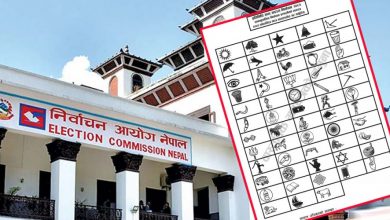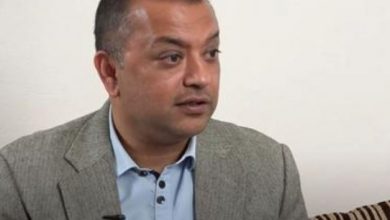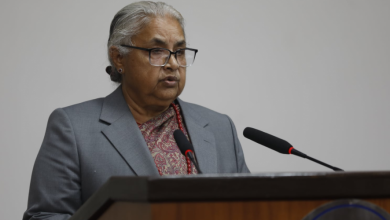Nepal and UAE can work together for tolerance and harmony: Ambassador Al Shamsi (interview)
February 4, Kathmandu: Three years ago, the United Arab Emirates (UAE) hosted the historic signing of the “Document on Human Fraternity” by Pope Francis and the Grand Imam of Al-Azhar. This led to the establishment of The International Day of Human Fraternity on February 4, promoting cultural and religious tolerance. Recently, Radio Nepal’s Kaushal Ghimire discussed its significance with the UAE Ambassador to Nepal, Abdullah Al Shamsi, emphasizing goodwill, tolerance, and fraternity worldwide.

The International Day of Human Fraternity is observed annually on February 4th and it serves as a platform to raise awareness about the importance of fraternity and cooperation across cultures and religions. What role does the UAE play in promoting interfaith dialogue and cooperation globally?
Ambassador Al Shamsi: The UAE celebrates the International Day of Human Fraternity with different events to remind people about the importance of working together across different cultures and religions. This day helps celebrate our differences, promote acceptance, and remind us that we’re all connected as human beings. The UAE also helps promote understanding between different faiths by working together, organizing events, and supporting projects that encourage respect and peace among all people.
The Zayed Award for Human Fraternity recognizes individuals and organizations who have made outstanding contributions to promoting peace and compassion. Can you highlight some of the recipients and their impactful initiatives?
Ambassador Al Shamsi: The Zayed Award for Human Fraternity recognizes individuals and organizations that have demonstrated exceptional commitment to promoting peace, compassion, and understanding among people of different backgrounds. Recipients of the award have made significant contributions to fostering dialogue, reconciliation, and social harmony. For example, in 2022, the King and Queen of Jordan received the award along, with the Haitian Foundation for Knowledge and Liberty. In 2023, a Kenyan community organizer and activist, and a Catholic lay group received the award.
The Abrahamic Family House project is a significant endeavour which aims at promoting coexistence and mutual respect among Muslims, Christians, and Jews. Could you share more details about the vision and progress of this project?
Ambassador Al Shamsi: This project underscores the common values shared among Islam, Christianity, and Judaism, emphasizing peaceful coexistence. Key initiatives include the International Day of Human Fraternity, observed annually on February 4th, to advocate fraternity and cooperation across cultural and religious boundaries.
Interfaith dialogue forums and conferences gather religious leaders and practitioners to discuss common challenges and foster understanding.
Additionally, educational programs promote interfaith education among youth and communities, nurturing empathy, tolerance, and diversity appreciation. These endeavours are pivotal in advancing human fraternity principles, fostering peace, and bridging religious and cultural divides.
As the ambassador of the UAE to Nepal, how do you see the role of Nepal in advancing the principles of human fraternity and interfaith within its diverse society?
Ambassador Al Shamsi: There are many common principles between Nepal and the UAE, and religious harmony is one of them, as religious and ethnic sects live in tolerance, reconciliation and freedom of worship without interference from other religions. For your kind information, in the UAE about 200 nationalities enjoy freedom of worship in harmony.
How can individuals and communities around the world contribute to the goals of the higher committee of the Human fraternity?
Ambassador Al Shamsi: Individuals and communities around the world can contribute to the goals of the Higher Committee of Human Fraternity by fostering understanding, respect, and cooperation among people of different backgrounds. They can promote dialogue, tolerance, and empathy in their daily interactions, support initiatives that promote peace and harmony, and advocate for policies that uphold human rights and dignity for all.
Additionally, they can participate in interfaith activities, volunteer for humanitarian causes, and educate others about the importance of embracing diversity and building inclusive communities.
Looking ahead, what are the plans and aspirations of the Higher Committee of Human Fraternity, and how do you envision its role in shaping a more peaceful and inclusive world?
Ambassador Al Shamsi: Looking ahead, the Higher Committee of Human Fraternity is poised to expand its endeavours in promoting peace, tolerance, and understanding globally.
Its plans encompass reaching out to more communities, organizations, and governments worldwide to foster dialogue and cooperation, launching innovative initiatives to address emerging challenges and promote interfaith harmony, empowering youth through educational programs and leadership opportunities, advocating for policy changes that promote human fraternity, social justice, and peace, and strengthening partnerships with civil society organizations, religious leaders, and stakeholders to amplify efforts towards a more peaceful and inclusive world.
The committee visualizes itself as a substance for positive change, fostering a culture of empathy, respect, and solidarity among people of different faiths and backgrounds, ultimately contributing to a more peaceful and inclusive world.









Comments